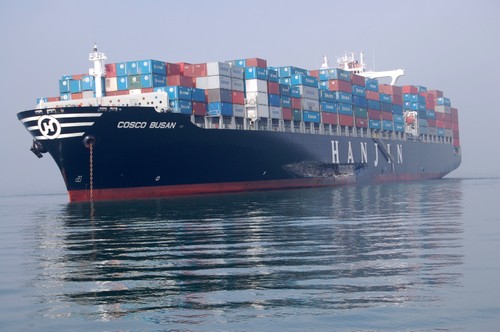The Harsh Reality of US Coast Guard Migrant Policy
by John Konrad (gCaptain) When merchant and cruise ships rescue migrants at sea, they offer more than just a lifeline from the perilous waters; they provide critical sustenance and care....


The NTSB’s investigation into the 2007 Cosco Busan allision in San Francisco was one of 5 recent incidents that the NTSB looked into prior to the this week’s recommendation.
The National Transportation Safety Board on Tuesday issued a recommendation to the U.S. Coast Guard that would subject Coast Guard personnel involved in serious marine incidents to timely post-accident drug and alcohol testing as is required for merchant mariners.
Currently, Coast Guard regulations require that merchant mariners be drug and alcohol tested within specified time periods following a marine accident or serious incident while Coast Guard military and civilian personnel involved in similar events are subject to much lower, less stringent standards that only narrowly defines a timeframe for testing.
For example, although merchant mariners are required to provide a breath sample for alcohol testing within two hours of an accident, no specific timeframe for the test is provided for Coast Guard military personnel; Coast Guard civilian personnel are not required to submit to an alcohol test at all. And although the allowable blood alcohol level (BAC) for merchant mariners must be less than .04%, the Coast Guard has not specified an allowable BAC for its own personnel. The Coast Guard also does not specify a timeframe for post-accident drug testing for its military personnel, while requiring all merchant mariners to be drug tested within 32 hours of an accident.
The NTSB argues that considering Coast Guard personnel perform a number of safety-sensitive maritime roles similar to those of merchant mariners, such as operating vessels and monitoring vessel traffic, postaccident toxicological testing for Coast Guard personnel should “at least be equivalent to the standards for merchant mariners.”
The NTSB’s recommendation is based on investigations into five recent marine accidents including the 2007 Cosco Busan allision with San Francisco Bay Bridge, a 2008 collision between a passenger/car ferry and a coast guard cutter on Block Island Sound, and the October 2011 collision between a 799-foot-long tankship and the equally large MSC Nederland containership in the Houston Ship Channel near Houston, among others.
Specifically, the National Transportation Safety Board makes the following safety recommendations to the US Coast Guard:
The full safety recommendation letter is available at http://go.usa.gov/g2eT.
Join the gCaptain Club for curated content, insider opinions, and vibrant community discussions.


Join the 105,940 members that receive our newsletter.
Have a news tip? Let us know.
Access exclusive insights, engage in vibrant discussions, and gain perspectives from our CEO.
Sign Up




Maritime and offshore news trusted by our 105,940 members delivered daily straight to your inbox.



Essential news coupled with the finest maritime content sourced from across the globe.
Sign Up